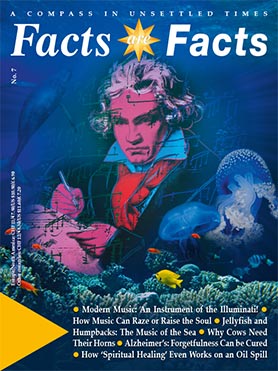Music and Psyche: Crippling Rhythms and Murderous Mice
What our youth consumes today is musical dynamite that not only leaves the ears deaf, but also poisons the soul and makes the body sick, which has been scientifically proven. There is a plan behind it whose goal is the eradication of traditional Western culture.
Do rodents understand the difference between classical music and hard rock? Not likely. And yet they react to it nevertheless. In the summer of 1997, a 16-year-old student from the U.S. state of Virginia achieved national fame and received top honours from, among others, the US Marines and—surprise, surprise!—the CIA. In a simple experiment, David Merrell managed to prove how music influences the intelligence and social behaviour of mice.
How Hard Rock Influences Rodents
For this experiment, the student had acquired genetically similar white mice from a laboratory. They were all male, of the same age and weight, received the same food and the same amount of light and were housed in equally large containers—72 plastic boxes.

Mouse in a labyrinth: made stupid and extremely aggressive by heavy metal music.
For one week, the mice were allowed to adjust to their new environment. After that, David let each animal run through a 1.5 x 1 metre labyrinth three times in a row and measured their times with a stopwatch. On average, the mice needed ten minutes to find their way through. Now David divided the mice into three groups with 24 animals in each group. One group was exposed to the vibrant music of Mozart for ten hours every day for three weeks. The second group had to listen to the heavy metal noise of the hard rock group Anthrax for the same amount of time. The volume was set at seventy decibels, which is about the same level as a vacuum cleaner or a television set from one metre away. The last group of 24 mice served as a control group i.e. was not exposed to any music. At the end of each week, all the mice ran through the labyrinth three times in a row while David timed their ‘run times’. You would think that even the dumbest mouse would remember at least part of the way through the maze after a certain period of time. And they did. In their twelfth and final run, the “unexposed” mice only needed half the time, that is, five instead of ten minutes. The results from the “classical mice” that had been ‘doped’ with Mozart were phenomenal: they conquered the course in one and a half minutes –less than a third of the best time from the control group!
And the “hard rock junkies”? Well, they beat themselves black and blue as they lurched through the labyrinth as if they were drunk, stumbling into the walls. Even though these poor rodents also only needed ten minutes to complete this task before the “AnthraxTherapy”, now their average time was thirty minutes, if you can believe it! That means that they took twenty times longer than the “classical mice”. David Merrell especially noticed that the maltreated “hard rock mice” didn’t lift their noses in the air once to sniff out the traces left by their preceding fellows. “The music seemed to have completely dulled their senses,” the student later commented.
But that isn’t all. The experiment described above was actually already David Merrell’s second attempt. The boy had tried to conduct the experiment one year earlier but had had to break it off early. The reason: David had kept all the mice of one group together in one cage. The rodents that were exposed to hard rock were so aggressive, however, that they bit each other to death. After three weeks, only one single killer mouse was still alive.
So David kept his mice in individual cages during the second experiment. The increased potential for violence due to heavy metal music lasted in what had been basically peaceful mice much longer than David had anticipated. After his experiment was successfully concluded, he wanted to dispose of the 72 animals (and the same number of cages) as quickly as possible. So he put all the mice of one group together in a large plastic aquarium to take them to the next pet shop. This arrangement was fine until he displaced the final group, the “hard rock mice”. As soon as the animals were together, they began to fight. After an hour, the boy had to separate them again because he feared they would not make it to the store alive.
So David prescribed the mice another week’s ‘vacation’ in silent solitary cages “so they could calm down”. When he then finally took them all together to the pet shop, the hard rock mice were fighting amongst themselves again. Even so, the short trip to the shop was not a journey into death for any of the animals.
Apparently, hard, aggressive music doesn’t only decrease the ability to learn, but also disrupts the social behaviour of mice—although these animals are neither remarkably intelligent nor especially sociable. And they certainly don’t understand the verbal trash that wells out of the mouths of these screaming rock-singers—in contrast to humans, which are significantly more developed and sensitive beings.
The Frankfurt School: Disintegration of the Christian Fabric
Decades ago clever heads were already conducting studies on how people could be dulled and made susceptible to outside influences through music. It’s no coincidence that those same intellectuals belonged to the Frankfurt School, which decisively influenced the revolutionary movement of ’68 through such iconic figures as Herbert Marcuse. This ideology, however, wasn’t so much about freedom as it was the destruction of traditional Christian values and thereby of Western culture. Max Horkheimer, another representative of the Frankfurt School, once said: “Justice and freedom as such, the idea that they are better than injustice and repression, is not scientifically verifiable and is thus useless. Therefore, it would be as nonsensical to say that red is more beautiful than blue, or that an egg is better than milk.” The cultural pessimist Horkheimer only recognised one elementary driving force in life: the constant fulfilment of desire. And so our current hedonistic culture is, in point of fact, an indicator of how effectively the Frankfurt School’s intellectual inheritance was able to infiltrate society.

Music informs water: Japanese researcher Masaru Emoto exposed distilled water to various pieces of music, froze it, and photographed the resulting water crystals. Order: Mozart’s Symphony No. 40 (top left), Bach’s Goldberg Variations (top right), Chaos: Japanese pop song (bottom left), heavy metal music (bottom right).
Because whoever still truly believes in something divine, acknowledges certain basic moral values that take precedence over supposedly “pure” reason. These people are usually not easily corruptible and will not let themselves be forced under the yoke of a dictatorial new world order.
Remember the saying that every child learns in the sandbox: when two people quarrel, a third rejoices. The Romans called this power game Divide et Impera—divide and conquer! This also clearly applies to the archrivals capitalism and communism, which, in reality, are puppets of one and the same power that remains in the shadows, which some call high finance and others the Illuminati. Intellectuals like Adorno or Marcuse faithfully served the goals of the Illuminati—even if they themselves were not aware of the fact.
The tentacles of these “enlightened ones” reach through to today’s music business (see pg. 8), which brings us back to our theme. In August 1996, shock-rocker Marilyn Manson stated in the music magazine Spin: “Hopefully, I’ll be remembered as the person who brought an end to Christianity.” You could almost laugh at such a bold provocation—after all, the self-proclaimed goal of shock-rockers is to shock—if it weren’t for the statement that Marilyn Manson made on his own website in February 2003. When asked by a fan if he was really a Freemason, he answered cryptically: “That question requires a better understanding of what that group [ed. Freemasonry] truly is, before I care to discuss my feelings. My genesis is deep in Bavaria. Things change, new names for old beliefs.” It was in Bavaria, however, that Adam Weishaupt officially founded the Order of the Illuminati in 1776.1 This secret band actually stems from the mists of prehistory and simply received “a new name for old beliefs” at that time.
Dependent on Trivial Sounds
Knowledge about the power of music is just as old. That is how, in biblical times, the Israelites are supposed to have made the walls of Jericho fall with the sound of their trumpets. Even older are the writings of the Indian Vedas that deal with the subject of music and its effects on people. The philosopher-doctors of ancient Greece also wrote which harmonic modes could be used to heal different emotional illnesses.
So it was only right that the cultural Marxists and secret destroyers of society also pursued these highly important themes. That happened in 1937 with the beginning of the Radio Research Project, which was financed by the Rockefeller Foundation at the elite US University Princeton. Why in America? Because when the National Socialists (Nazis) came to power, the lives of Jews in Germany became increasingly difficult and so most of the members of the Frankfurt School emigrated to the US. In this research project directed by Paul Lazarsfeld, the main emphasis was on conducting psychological studies on mass culture, which was slowly starting to spread across America, thanks to radio and films. More to the point, they wanted to find out how the population could best be manipulated.
To this end, they studied for example the effects of Hollywood films on the brain, the influence of “soap operas” on society, and, even back then, the power of opinion polls, which led to the fact that today not only American politicians are more concerned with re-election than with the truth.
Theodor Adorno led the music department of the Radio Research Project and researched how banal music affects the listener. In his treatise, Popular Music, he concluded that you could addict people to even the most trivial songs through the regular repetition of catchy tunes because they will develop a real hunger for them. The German neurophysiologist and brain specialist, Lutz Jäncke, also confirmed the power of repetition: “We like what we frequently hear.” Repetition isn’t only limited to the regular playing of such songs in radio and TV music shows, but is also reflected in the construction of individual musical pieces: they are usually nothing more than the regurgitation of the same standardised musical leitmotifs, although today the musical styles that originated in black ghettos are intermixed with the disjointed stammering of ‘lyrics’. Added to which is the fact that most of the usual song lyrics contain little more vocabulary than that possessed by a small child: Cry Baby Cry, Don’t worry, be happy, etc. If people were to be regularly bombarded with such infantile songs through the radio, wrote Adorno already in 1941, it would not only create an addiction to this kind of music, but also a certain type of submissive, emotional person. For trivial music disillusions the one and pushes the other to frustration. Moreover, rebellious, wild music has the potential to destabilise society, according to Adorno.
Sources
- 1 Read more about the history of the Illuminati, their intentions, and machinations here: Illuminati: A Glimpse Behind the Scenes






